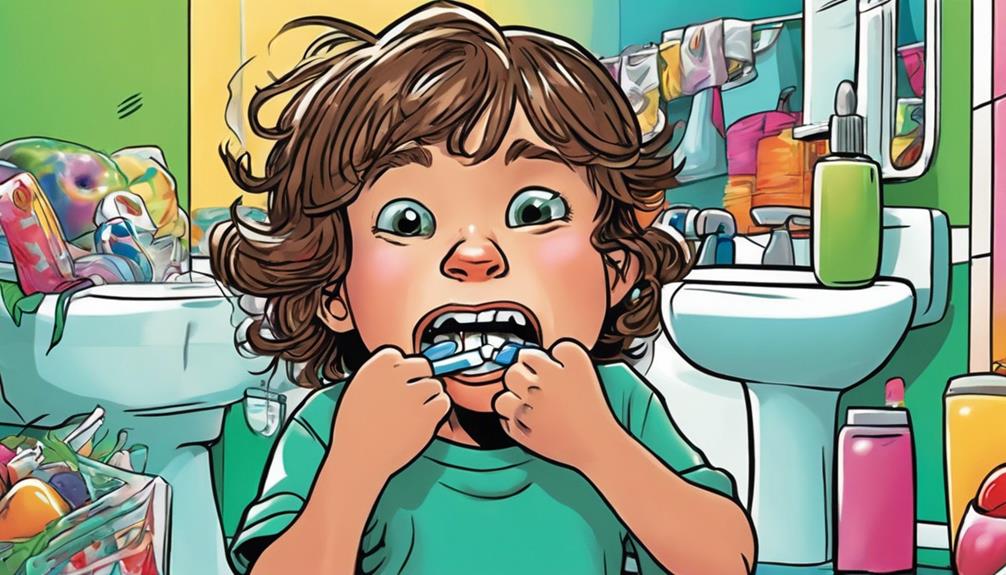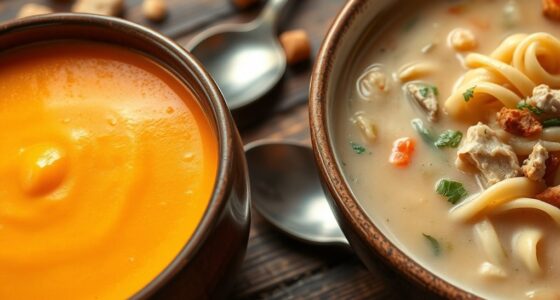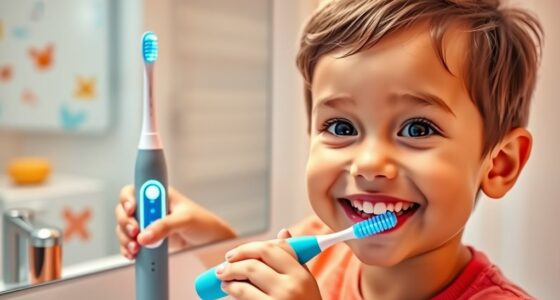When choosing tooth-friendly sports drinks, look for options with lower acidity and minimal added sugars, as these protect your enamel from erosion and cavities. Natural beverages like infused water, coconut water, or herbal teas are gentler on your teeth. Artificial sweeteners tend to be safer than sugars. To keep your smile healthy during activities, rinse with water afterward and consider using a straw. Want to discover more about making smart hydration choices? Keep exploring for tips and ideas.
Key Takeaways
- Choose sports drinks with lower acidity levels and minimal artificial acids like citric acid to reduce enamel erosion risks.
- Opt for beverages with artificial sweeteners instead of high sugar content, as they pose less cavity risk.
- Check labels for preservatives and flavor additives; fewer additives often mean less erosive potential.
- Natural hydration options like infused water, herbal teas, or coconut water are more tooth-friendly than conventional sports drinks.
- Rinse your mouth with water after consuming sports drinks to neutralize acids and protect enamel.
Understanding the Impact of Acidity on Tooth Enamel
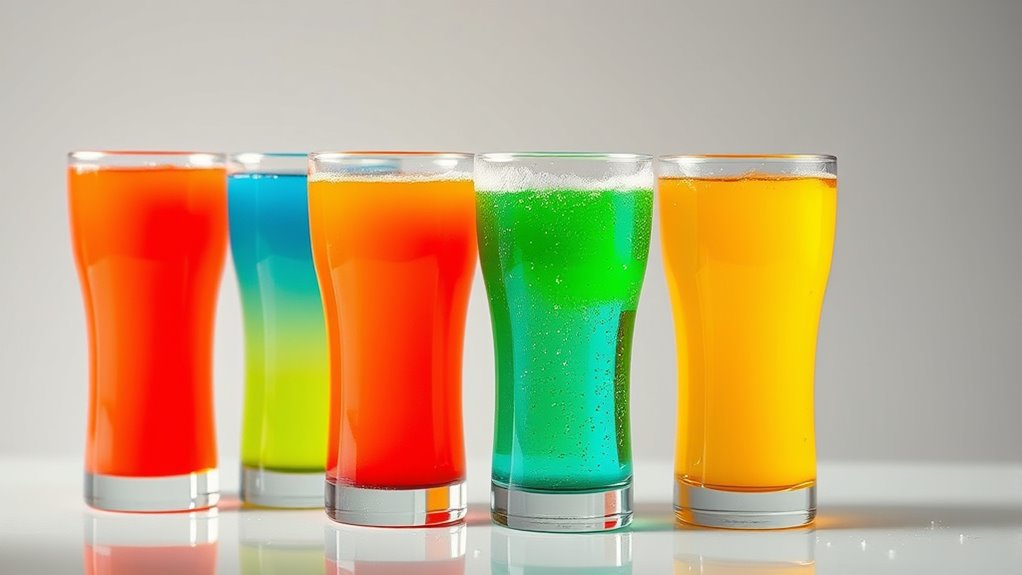
Since tooth enamel is the body’s hardest substance, it might seem immune to everyday acids, but that’s not the case. When you consume sports drinks, their acidity can lower the pH balance in your mouth, leading to enamel erosion. Enamel erosion occurs when acids weaken the enamel surface, making your teeth more vulnerable to decay and sensitivity. Even if enamel seems tough, prolonged exposure to acidic beverages can gradually wear it down. It’s important to understand that maintaining a neutral pH in your mouth helps protect your teeth. Drinking water afterward or limiting the intake of highly acidic drinks can help preserve your enamel. Recognizing the impact of acidity on your teeth is key to making smarter choices for your oral health. Additionally, understanding air purifier technologies can help you create a healthier environment that supports overall wellness.
Key Ingredients to Watch Out For in Sports Drinks
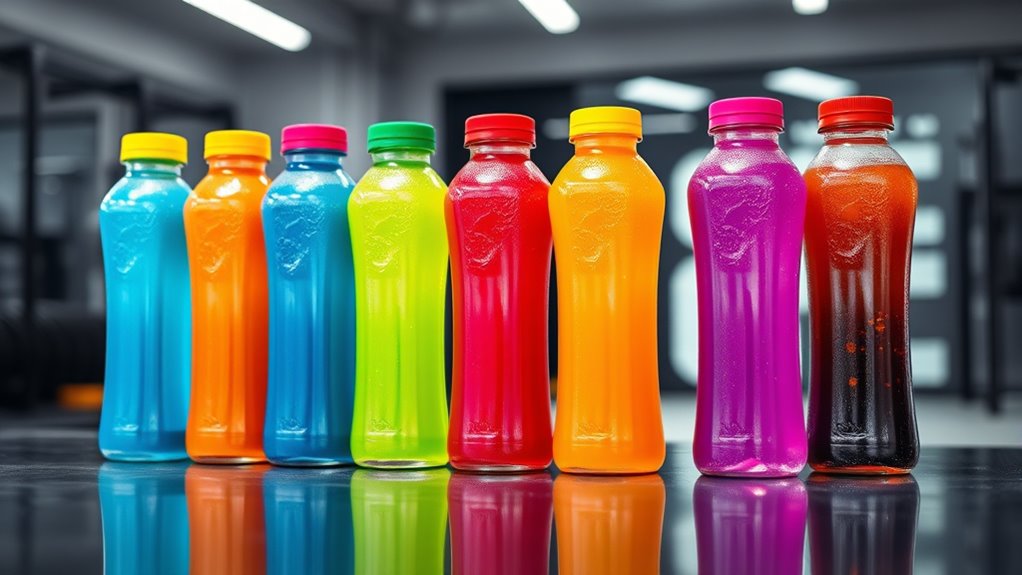
| Ingredient Type | Common Examples | Potential Impact on Teeth |
|---|---|---|
| Flavor Additives | Artificial sweeteners, flavorings | Mask sweetness, may contain sugars |
| Preservative Effects | Sodium benzoate, parabens | Can contribute to acidity or dry mouth |
| Sugars | Glucose, fructose | Promote decay if excessive |
| Artificial Sweeteners | Aspartame, sucralose | Fewer sugars but some concerns |
| Acidic Additives | Citric acid, phosphates | Increase acidity, risk erosion |
Additionally, some flavor additives may contain artificial colors, which can cause sensitivities in certain individuals.
Comparing Acidity Levels of Popular Sports Beverages
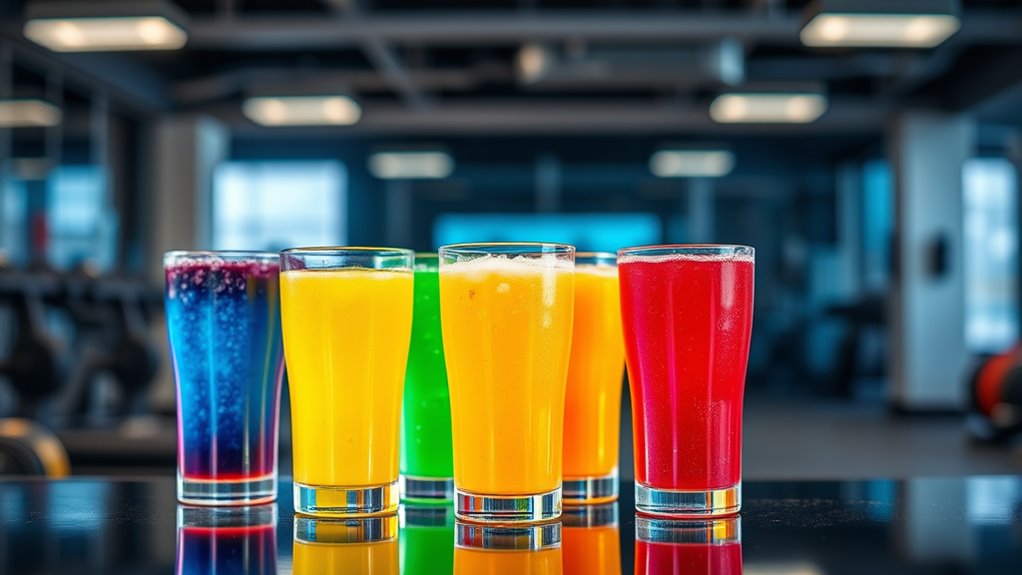
Understanding the acidity levels of popular sports beverages helps you make smarter choices for your dental health. Many drinks contain flavor additives that enhance taste but can also influence acidity, making them more erosive. Beverages with higher acidity levels, often due to citric acid or phosphoric acid, pose a greater risk to your tooth enamel. Additionally, some drinks use preservatives that may slightly alter pH levels, affecting how harmful they are to your teeth. Comparing these acidity levels reveals that some sports drinks are more tooth-friendly than others. Opting for beverages with lower acidity can help protect your enamel over time. Always check the label for pH information and consider how flavor additives and preservative effects contribute to the overall acidity of your chosen sports drink. Incorporating awareness of dental erosion can further help you select beverages that maintain your oral health.
Sugar Content and Its Role in Dental Health

You might not realize how much sugar is in your favorite sports drink, but it can considerably increase your risk of cavities. When sugar interacts with bacteria in your mouth, it produces acids that weaken your enamel. Over time, this can reduce your tooth’s durability and lead to lasting damage. Using tooth-friendly beverages can help mitigate these risks and support better dental health.
Sugar Levels and Cavities
High sugar levels in sports drinks can substantially increase your risk of developing cavities. When drinks contain high amounts of sugar, bacteria in your mouth feed on it, producing acids that erode tooth enamel. Flavor additives often mask the sweetness, encouraging you to consume more, which worsens the problem. Additionally, packaging materials like plastic bottles and cans may contain residues or leach chemicals that can affect oral health over time. The more sugary and flavored a drink is, the greater the chance of acid attacks on your teeth. Even if a beverage is marketed as healthy or low-calorie, it may still contain added sugars or sweeteners that contribute to cavity formation. Being mindful of sugar content helps you protect your teeth from decay.
Impact on Enamel Durability
Sugar in sports drinks directly compromises enamel durability by fueling acids that weaken tooth surfaces. When acids erode enamel, your teeth become more susceptible to damage and sensitivity. Even flavor additives can intensify this process, making drinks more appealing but harmful. Packaging materials also play a role; some leach chemicals that may interact with acids, exacerbating enamel erosion. To protect your teeth, choose drinks with low sugar content and minimal flavor additives. Be mindful of packaging—opt for bottles that don’t contain harmful chemicals. Regularly rinsing your mouth after consuming sports drinks can help neutralize acids. Avoid sipping slowly over long periods, as prolonged exposure accelerates enamel breakdown. Prioritize hydration options that support enamel strength, like water or electrolyte drinks with no added sugars. Recognizing acidic pH levels in certain beverages can further help you avoid those most damaging to your enamel.
Natural vs. Artificial Sweeteners: Which Is Safer for Your Teeth?

When choosing sweeteners for sports drinks, understanding the differences between natural and artificial options is essential for your dental health. Natural sugars, like honey or fruit extracts, may seem healthier but can still promote tooth decay if consumed frequently, as bacteria feed on sugars and produce acids. Artificial sweeteners, such as aspartame or sucralose, contain fewer or no fermentable carbs, making them less likely to cause cavities. However, some studies suggest that certain artificial sweeteners may affect your gut health, though their impact on teeth is minimal. Overall, artificial sweeteners are generally safer for your teeth compared to natural sugars, which can contribute to enamel erosion if consumed excessively. Choosing drinks with artificial sweeteners can help protect your smile while keeping your favorite flavors.
Tips for Minimizing Dental Damage While Staying Hydrated
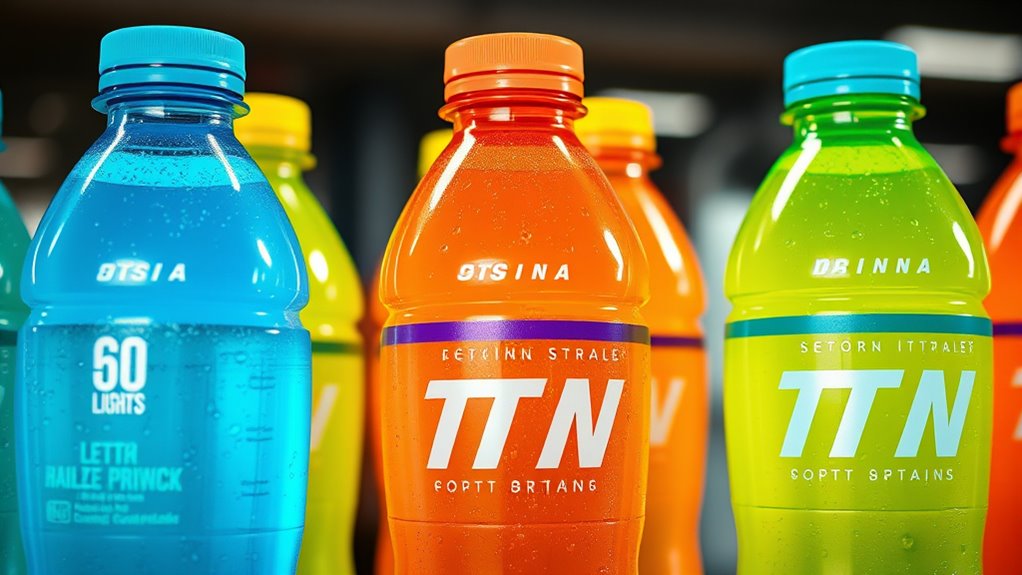
To protect your teeth while staying hydrated, opt for low-sugar sports drinks whenever possible. Using a straw can also help minimize contact between the sugary liquid and your teeth. These simple steps can make a big difference in reducing dental damage.
Choose Low-Sugar Options
Choosing low-sugar sports drinks is one of the best ways to protect your teeth while staying hydrated. Lower sugar content reduces the risk of tooth decay and enamel erosion. When selecting these drinks, look for options that still offer good flavor enhancement without added sugars. Check packaging materials—preferably those that minimize exposure to leaching chemicals or preservatives that could harm your oral health. Consider the following tips:
- Choose drinks with natural sweeteners or flavor enhancers that don’t spike blood sugar.
- Read labels carefully to avoid hidden sugars and artificial additives.
- Opt for smaller bottles to limit exposure time and reduce acid contact.
- Select drinks in packaging materials that keep the product fresh without compromising your health.
- Additionally, wall organization solutions can help keep your hydration area tidy and accessible, promoting better beverage choices and overall home organization.
Use a Straw
Using a straw while drinking sports beverages can considerably reduce contact between the liquid and your teeth, helping to protect enamel from acids and sugars. This simple tip minimizes exposure to harmful substances, especially when drinks contain flavor additives that can increase acidity. Choose a reusable or eco-friendly straw to avoid plastic waste, and be mindful of packaging materials—they can sometimes contain chemicals that may leach into the beverage. When using a straw, aim to position it toward the back of your mouth, reducing direct contact with front teeth. To further safeguard your smile, rinse your mouth with water afterward. Additionally, proper oral hygiene plays a crucial role in maintaining dental health while staying hydrated. Remember, consistent oral hygiene and mindful drinking habits are key to maintaining healthy teeth while staying hydrated.
Alternative Hydration Options That Are Gentle on Teeth
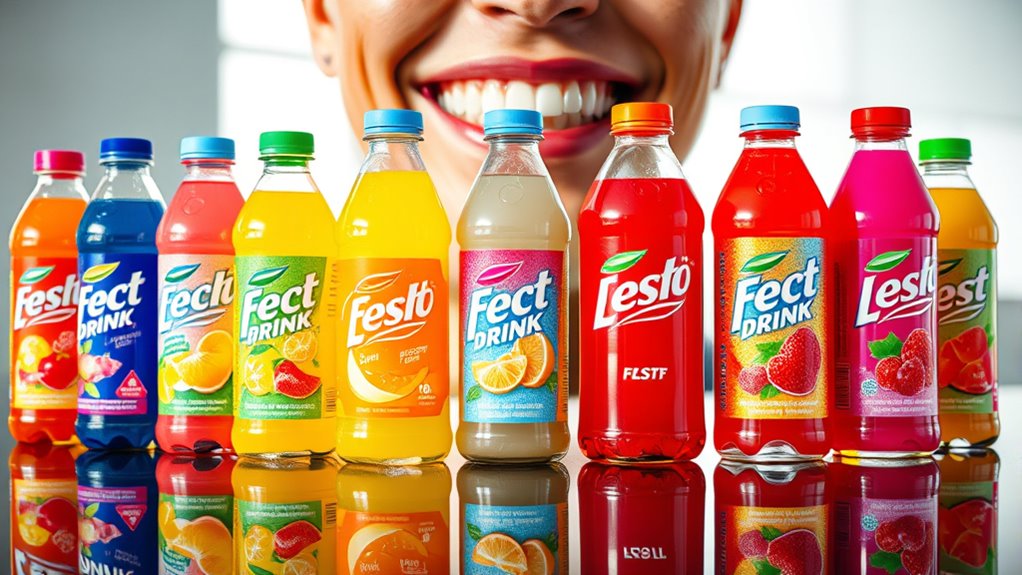
If you’re looking to stay hydrated without risking damage to your teeth, several gentle alternatives to sports drinks can help. Many hydration myths suggest that only commercial sports drinks maintain electrolyte balance, but natural options work just as well. These alternatives are less acidic and won’t erode enamel. Consider:
Stay hydrated with natural, tooth-friendly alternatives to sports drinks like infused water and coconut water.
- Water infused with fruits or herbs for flavor and minerals
- Coconut water, naturally rich in electrolytes
- Herbal teas, such as chamomile or mint, served cold
- Homemade electrolyte drinks with a pinch of salt and honey
Additionally, choosing tooth-friendly hydration options can help protect your enamel while maintaining electrolyte balance. They’re practical, tooth-friendly, and effective for maintaining hydration, especially during physical activity.
Practical Advice for Protecting Your Smile During Physical Activities
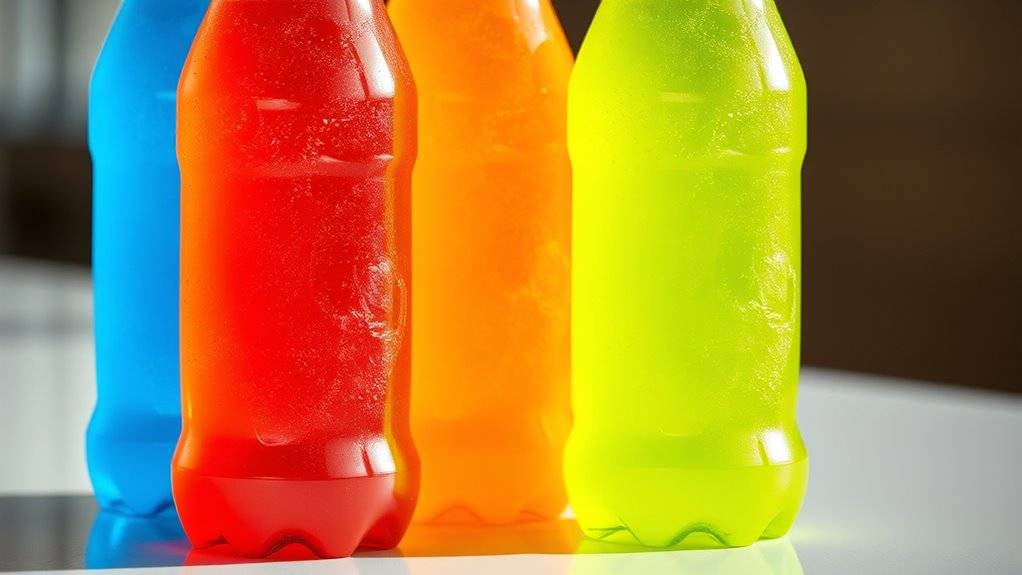
Staying hydrated during physical activities is important, but protecting your smile is just as essential. To do this, focus on smart hydration strategies and sports nutrition choices that minimize acid exposure. Drink water regularly, especially during intense exercise, to reduce the need for sugary or acidic drinks. Use a straw to help bypass contact with your teeth, and rinse your mouth with water after consuming sports drinks. Avoid holding drinks in your mouth or sipping slowly over time. Here’s a quick comparison:
| Hydration Method | Impact on Dental Health |
|---|---|
| Water | Tooth-friendly, neutral |
| Sports Drinks | Risk of acid erosion, decay |
| Electrolyte Tablets | Use with water, minimal risk |
Implementing these tips helps protect your smile while maintaining effective sports nutrition.
Frequently Asked Questions
Are All Sports Drinks Equally Harmful to Dental Health?
Not all sports drinks are equally harmful to your dental health. You should consider their sugar content and pH levels, as higher sugar and lower pH (more acidic) can erode enamel and promote cavities. Some drinks have lower sugar and are less acidic, making them better choices. Always read labels and consume in moderation, especially if you’re concerned about your teeth. Proper brushing and rinsing can also help protect your smile.
How Quickly Can Sports Drinks Damage Tooth Enamel?
You might wonder how quickly sports drinks can damage your enamel. The answer depends on factors like acid exposure and your oral habits, but damage can begin within just 30 minutes of frequent consumption. The acids in these drinks cause enamel erosion by weakening the tooth surface. To protect your teeth, avoid sipping continuously and rinse your mouth with water afterward to minimize acid exposure and slow down enamel erosion.
Do Dental Sealants Offer Protection Against Sports Drink Acidity?
Oh, the glamorous world of dental sealants—because who doesn’t want their teeth armor-plated, right? Well, dental sealant effectiveness varies, and sealant longevity depends on your habits. While they provide a barrier, they aren’t invincible against acids from sports drinks. Think of sealants as a helpful but not foolproof shield—so, don’t skip brushing, and enjoy your drinks wisely to keep your smile shining.
Can Rinsing With Water Negate the Effects of Sports Drinks?
Rinsing with water after drinking sports drinks can help reduce acid erosion and preserve your enamel. When you swish water around your mouth, it helps wash away the acids that cause erosion. While it’s not a perfect solution, this simple step minimizes damage and supports enamel preservation. To protect your teeth best, combine rinsing with good oral hygiene and limit frequent exposure to acidic sports drinks.
What Are Some Affordable, Tooth-Friendly Hydration Alternatives?
Imagine your mouth as a garden; keeping it healthy means choosing the right drinks. You can opt for affordable, tooth-friendly natural hydration options like flavored water or homemade fruit-infused water. These alternatives hydrate effectively without the acidity of sports drinks, protecting your teeth. They’re easy to prepare, budget-friendly, and promote overall oral health, ensuring you stay refreshed and cavity-free while enjoying tasty, natural hydration.
Conclusion
So, next time you reach for that flashy sports drink, remember: your teeth aren’t just along for the ride—they’re the real MVPs. Choose wisely, watch those acids and sugars, and maybe, just maybe, consider water’s humble charm. After all, if you’re serious about winning, don’t let a little enamel erosion be your unsung villain. Stay hydrated, stay smart, and keep that smile shining—your teeth will thank you when the medals are all in.


